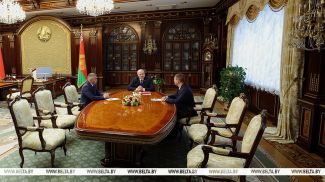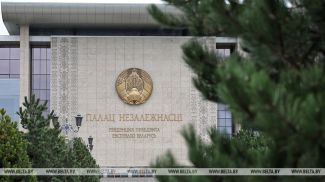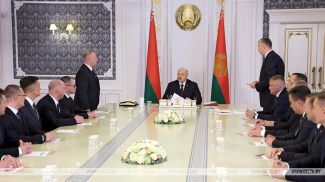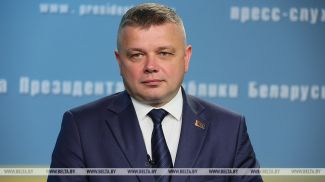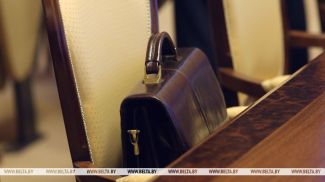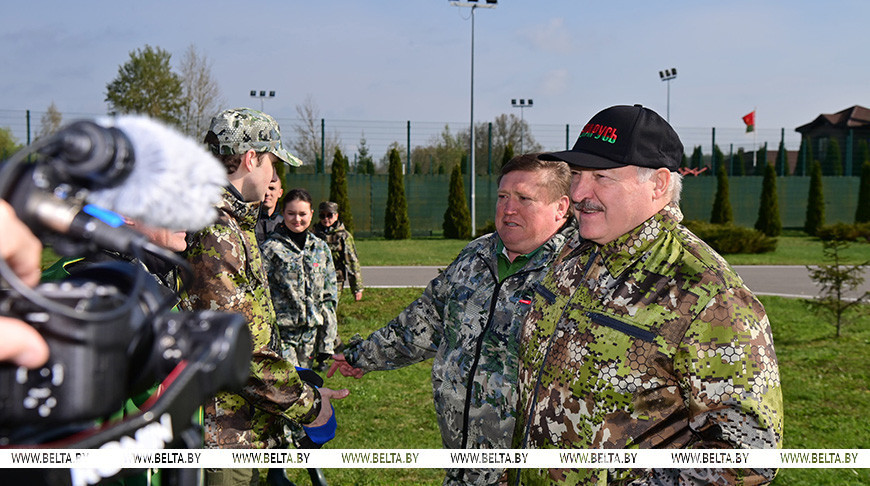
MINSK, 22 April (BelTA) – Belarusian President Aleksandr Lukashenko praised Belarusian farmers twice this week and suggested scaling up this form of farming, including by transferring additional farmland to farmers. The head of state raised this topic first at the meeting to discuss the agricultural industry on 16 April, and then during the subbotnik on 20 April where he was joined by one of successful young farmers, BelTA has learned.
Let us recall the 16 April meeting when the president discussed the state and prospects of private farming in the country. He noted that previously this issue had not been very relevant for Belarus: the number one task was to save agriculture, and not cut up the land and distribute it in pieces. Now times are different.
“If a well-to-do private owner approaches you and wants to take over one or several collective farms in Vitebsk Oblast or Mogilev Oblast, give it to them. And peasants have no reason to feel bad about us today. I acknowledge that it was the case 25 years ago. Had we started giving assets away, we would have got an agrarian revolution. By now, private owners have proven themselves. And if there are smart private farmers who are ready to work, let them work using a lease scheme for two or three years, as we did in Vitebsk Oblast where we gave a private owner two farms. I check on him every now and them: it seems like he is trying, he is involved, he earns money somewhere on the side and invests it there. Such farmers should get the greenlight,” said the head of state.
One of the participants of the president’s subbotnik was Igor Abramchik, head of the private farming enterprise Spartan-Agro located in Molodechno District, Minsk Oblast. He can be described as a hereditary farmer: the business was started by his father. He makes money by gardening although he is an IT specialist by education and has graduated from Belarusian State University of Informatics and Radioelectronics (BSUIR). He grew up in the countryside. This is why the young man went back to work the land. He used the knowledge he acquired while in the university. Igor Abramchik said that everything on his farm is computerized - from the weather station to watering and fertilizing the trees.
There are no problems with sales either - direct contracts have been concluded with buyers from Smolensk to Khabarovsk, the farmer proudly said.
“A farmer. A hard worker. By the way, he is not an agrarian by education,” the head of state said as he introduced Igor Abramchik to reporters. Aleksandr Lukashenko suggested the farmer should step up his operations right away: “We can give you a kolkhoz. I advise you to select a good farm while the supply lasts. The local lands are quite good.”
To some, such statements by the head of state may seem very unconventional, but the truth is that Aleksandr Lukashenko never rejected, but even supported the idea of private farming. Yet, in the 1990s, the most valuable assets, including in agriculture, could have easily ended up in the hands of sneaky businessmen, including those with foreign citizenship. And the Belarusian people and people working on the land would have been left with nothing. Therefore, back then large-scale production - large state-owned agricultural enterprises - became the drivers and pillars of the domestic agricultural industry and, in fact, saved the industry from ruin. It was necessary to concentrate production resources and finances.
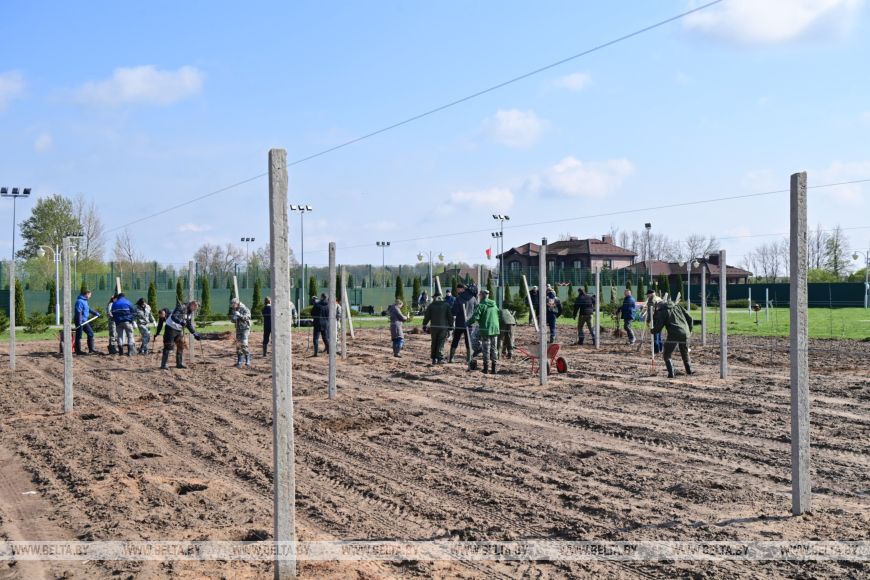
In addition, Aleksandr Lukashenko has always called to keep in mind that state-run organizations carry a huge social burden. “I often come across successful farmers and ask them what they need. They say: “Aleksandr Grigorievich, give me some land.” Okay, I say, take it. Here is a list of agricultural enterprises with mediocre performance, there are twenty percent of them in the country today. Take one and do business there. But they need land, they don’t need farms, they don’t need facilities, complexes, grain farms, and most importantly, they don’t need villages and people,” the president said in April 2019.
At the same time, Aleksandr Lukashenko has always adhered to the principle that the most efficient owner should work on the land. Yet, along with encouraging entrepreneurial spirit, the president does not forget about the main thing - the interest of the state and ordinary people.
The head of state visits farmers quite regularly, because people who truly love to work and know how to work on the land are also a state interest.
By the way, Aleksandr Lukashenko was personally involved in the creation of the farmers’ market near Minsk.
“An enterprise cannot do well without a good manager. Give me one hundred revolutionary ones and we will turn Belarus around. There are good people. Giving them lands sounds like a good idea. Let them work,” Aleksandr Lukashenko said as he was visiting a farm in Logoisk District in July 2016.
In April 2012, the head of state had a similar conversation with residents of the agricultural town of Olshany in Stolin District, Brest Oblast. This is the so-called cucumber capital of Belarus populated by smart and hardworking people. They did not ask for support from the state, they asked for only one thing - land.
“The main thing is efficiency. The land should be owned by the one who can handle it better. And we need to stop this fuss,” the head of state emphasized. “We need to deal with this problem on multiple levels, which includes the construction of farm houses and resettlement of people. These people need to be busy. They are asking for work and land. You can only dream of it.”
The head of state makes an important remark: if a state-run agricultural enterprise operates efficiently and at a profit, it does not make any sense to give its land to farmers or individuals as subsidiary plots. “We need efficient operation of farms and money in the accounts. But if it cannot work the way a farmer or private owner does, then we need to take the land and give it to them, but we need to help them sell their products as well,” he said.
As we see, Aleksandr Lukashenko puts efficiency at the core, without forgetting about social security. And the latest statements on private farming attest to the successful implementation of the government policy in the agricultural sector. Indeed, land and the agricultural sector are crucial elements of national security, and food security in particular. Due to agriculture people can put food on the table.
To put it simply, the state currently has a number of large, critical and successful enterprises. They fully meet the country’s needs for food and are major exporters. Yet, there are 20% of organizations that are not yet up to the task, to put it mildly. The state does not abandon them and is trying to turn them around, and in some cases it transfers them to more successful neighboring farms, because this is not just about land, but also about people working on it. And one of the options is private farming. And since there are successful examples, then why not take the next steps in this direction. I think this is the logic behind the president’s actions and statements on this topic. This is his signature style - to do everything without revolutionary changes, gradually and carefully, taking into account national peculiarities and people’s opinions.
Let us recall the 16 April meeting when the president discussed the state and prospects of private farming in the country. He noted that previously this issue had not been very relevant for Belarus: the number one task was to save agriculture, and not cut up the land and distribute it in pieces. Now times are different.
“If a well-to-do private owner approaches you and wants to take over one or several collective farms in Vitebsk Oblast or Mogilev Oblast, give it to them. And peasants have no reason to feel bad about us today. I acknowledge that it was the case 25 years ago. Had we started giving assets away, we would have got an agrarian revolution. By now, private owners have proven themselves. And if there are smart private farmers who are ready to work, let them work using a lease scheme for two or three years, as we did in Vitebsk Oblast where we gave a private owner two farms. I check on him every now and them: it seems like he is trying, he is involved, he earns money somewhere on the side and invests it there. Such farmers should get the greenlight,” said the head of state.
One of the participants of the president’s subbotnik was Igor Abramchik, head of the private farming enterprise Spartan-Agro located in Molodechno District, Minsk Oblast. He can be described as a hereditary farmer: the business was started by his father. He makes money by gardening although he is an IT specialist by education and has graduated from Belarusian State University of Informatics and Radioelectronics (BSUIR). He grew up in the countryside. This is why the young man went back to work the land. He used the knowledge he acquired while in the university. Igor Abramchik said that everything on his farm is computerized - from the weather station to watering and fertilizing the trees.
There are no problems with sales either - direct contracts have been concluded with buyers from Smolensk to Khabarovsk, the farmer proudly said.
“A farmer. A hard worker. By the way, he is not an agrarian by education,” the head of state said as he introduced Igor Abramchik to reporters. Aleksandr Lukashenko suggested the farmer should step up his operations right away: “We can give you a kolkhoz. I advise you to select a good farm while the supply lasts. The local lands are quite good.”
To some, such statements by the head of state may seem very unconventional, but the truth is that Aleksandr Lukashenko never rejected, but even supported the idea of private farming. Yet, in the 1990s, the most valuable assets, including in agriculture, could have easily ended up in the hands of sneaky businessmen, including those with foreign citizenship. And the Belarusian people and people working on the land would have been left with nothing. Therefore, back then large-scale production - large state-owned agricultural enterprises - became the drivers and pillars of the domestic agricultural industry and, in fact, saved the industry from ruin. It was necessary to concentrate production resources and finances.

In addition, Aleksandr Lukashenko has always called to keep in mind that state-run organizations carry a huge social burden. “I often come across successful farmers and ask them what they need. They say: “Aleksandr Grigorievich, give me some land.” Okay, I say, take it. Here is a list of agricultural enterprises with mediocre performance, there are twenty percent of them in the country today. Take one and do business there. But they need land, they don’t need farms, they don’t need facilities, complexes, grain farms, and most importantly, they don’t need villages and people,” the president said in April 2019.
At the same time, Aleksandr Lukashenko has always adhered to the principle that the most efficient owner should work on the land. Yet, along with encouraging entrepreneurial spirit, the president does not forget about the main thing - the interest of the state and ordinary people.
The head of state visits farmers quite regularly, because people who truly love to work and know how to work on the land are also a state interest.
By the way, Aleksandr Lukashenko was personally involved in the creation of the farmers’ market near Minsk.
“An enterprise cannot do well without a good manager. Give me one hundred revolutionary ones and we will turn Belarus around. There are good people. Giving them lands sounds like a good idea. Let them work,” Aleksandr Lukashenko said as he was visiting a farm in Logoisk District in July 2016.
In April 2012, the head of state had a similar conversation with residents of the agricultural town of Olshany in Stolin District, Brest Oblast. This is the so-called cucumber capital of Belarus populated by smart and hardworking people. They did not ask for support from the state, they asked for only one thing - land.
“The main thing is efficiency. The land should be owned by the one who can handle it better. And we need to stop this fuss,” the head of state emphasized. “We need to deal with this problem on multiple levels, which includes the construction of farm houses and resettlement of people. These people need to be busy. They are asking for work and land. You can only dream of it.”
The head of state makes an important remark: if a state-run agricultural enterprise operates efficiently and at a profit, it does not make any sense to give its land to farmers or individuals as subsidiary plots. “We need efficient operation of farms and money in the accounts. But if it cannot work the way a farmer or private owner does, then we need to take the land and give it to them, but we need to help them sell their products as well,” he said.
As we see, Aleksandr Lukashenko puts efficiency at the core, without forgetting about social security. And the latest statements on private farming attest to the successful implementation of the government policy in the agricultural sector. Indeed, land and the agricultural sector are crucial elements of national security, and food security in particular. Due to agriculture people can put food on the table.
To put it simply, the state currently has a number of large, critical and successful enterprises. They fully meet the country’s needs for food and are major exporters. Yet, there are 20% of organizations that are not yet up to the task, to put it mildly. The state does not abandon them and is trying to turn them around, and in some cases it transfers them to more successful neighboring farms, because this is not just about land, but also about people working on it. And one of the options is private farming. And since there are successful examples, then why not take the next steps in this direction. I think this is the logic behind the president’s actions and statements on this topic. This is his signature style - to do everything without revolutionary changes, gradually and carefully, taking into account national peculiarities and people’s opinions.




